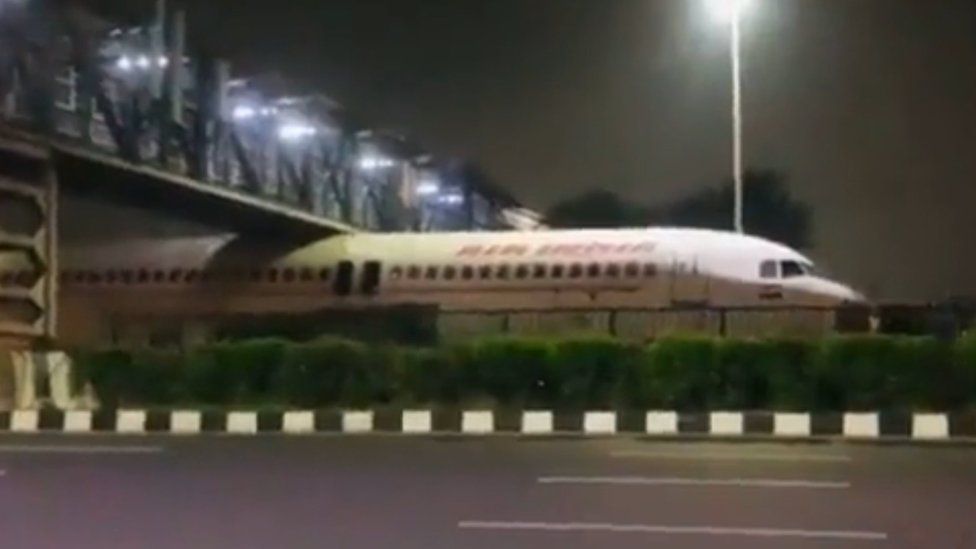


India's Deputy Civil Aviation Minister has revealed that there have been almost 1000 hoax bomb threats made to the country's airlines this year, nearly 10 times more than the previous year. These false claims, which are mostly made through social media, have resulted in diverted planes and rising costs for airlines. Despite the high number of threats, no actual danger has been detected.
Hoax Bomb Threats: A Rising Threat to Indian Aviation
Indian authorities have sounded the alarm over a surge in hoax bomb threats targeting airlines in the country. According to India's Deputy Civil Aviation Minister, there have been nearly 1,000 such threats this year, a sharp increase from the 100 reported in the previous year.
Background
Hoax bomb threats have been a recurring problem in India for several years. In 2018, a series of such threats led to the diversion of multiple flights and created widespread panic among passengers and airlines. The following year, a hoax threat forced the evacuation of the Indira Gandhi International Airport in Delhi, causing major disruption to air travel.
Modus Operandi
Most hoax bomb threats are made through social media platforms, such as Twitter and Facebook. In many cases, anonymous callers have made phone calls to airlines or airport authorities claiming to have planted bombs on board flights. These claims have often been false, leading to wasted time, resources, and heightened anxiety.
Impact on Airlines
The surge in hoax bomb threats has had a significant impact on Indian airlines. Each threat requires a thorough investigation and diversion of the aircraft to a safe location. This can result in costly delays, flight cancellations, and increased security measures. The additional expenses incurred by airlines as a result of these threats are passed on to passengers in the form of higher airfares.
Consequences
Despite the high number of threats, no actual bombs or explosives have been discovered in any of the incidents investigated. This has led to concerns that the hoax threats are being used as a tool for extortion or to create panic. Law enforcement agencies are actively investigating the source of these threats and have arrested several individuals in connection with them.
Top 5 FAQs
1. What is a hoax bomb threat? A hoax bomb threat is a false claim that a bomb has been placed somewhere, typically made with the intent to cause fear or disruption.
2. How are hoax bomb threats made? In the case of India, most hoax bomb threats are made through social media or anonymous phone calls.
3. What are the consequences of making a hoax bomb threat? Individuals who make hoax bomb threats can face serious legal consequences, including imprisonment and fines.
4. What happens when a hoax bomb threat is received? When a hoax bomb threat is received, authorities typically initiate a thorough investigation, which may include diverting the aircraft and conducting security checks.
5. How can passengers stay safe when hoax bomb threats are made? Passengers are advised to remain calm and follow the instructions of airline and airport staff. They should report any suspicious activity or receive threats to the authorities immediately.

The Pasighat police in East Siang district, Arunachal Pradesh have arrested the 33-year-old boys' hostel warden of Sanggo English School for sexually assaulting minor students. This came to light when a student was hospitalized for urogenital complications. The incident has sparked outrage from parents and the public, demanding strict action against the accused warden. In response, the Arunachal Pradesh State Human Rights Commission (APSHRC) has taken suo motu cognisance and ordered for a detailed report on the investigation, victim protection, and school management.

Actress Siddiqa Begum, daughter and legal heir of Shah Bano, has served a legal notice on the makers of the upcoming Bollywood film 'Haq'. The notice states that the film's unauthorized depiction of the personal life of Shah Bano without the consent of her legal heirs is a violation of their rights. 'Haq' is based on the landmark 1985 Supreme Court case that granted maintenance to Shah Bano, a Muslim woman, from her divorced husband.

After four years, the 'Darbar Move' tradition in Jammu and Kashmir has been restored, fulfilling the promise of the government and bringing a boost to the economy. National Conference chief Farooq Abdullah expressed happiness, noting that those who sought to separate Jammu and Srinagar have failed. Chief Minister Omar Abdullah received a warm reception and inspected the secretariat premises after the ceremony, as security in the region was heightened for the occasion.

Delhi Legislative Assembly Speaker Vijender Gupta praised Swami Dayanand Saraswati as not just a saint and reformer, but also a pivotal figure in India's freedom struggle. Speaking at the International Arya Samaj Conference, Gupta highlighted how Swami Dayanand's teachings sparked a revolution that led to the nation's independence. The event was attended by esteemed guests including Gujarat Governor Acharya Devvrat and top officials from the Arya Samaj community, all paying tribute to the enduring impact and legacy of Swami Dayanand Saraswati.

The Metro Railway Kolkata has announced a major schedule expansion for its Yellow Line, which runs between Noapara and Jai Hind Bimanbandar (Airport) in Kolkata. Starting from 3 November, weekday operations will increase to 120 services with extended operating hours, providing greater convenience and accessibility to commuters. Weekend travellers will also see a significant frequency upgrade, making travel on Saturdays and Sundays hassle-free. This move is expected to improve the overall public transportation system in the city and benefit the commuters.

Despite some reassurances that online verticals focused on diversity will continue, NBC News has announced a round of layoffs that will impact about 150 employees, or 2% of their workforce. The cuts are said to be a result of cost-cutting measures in preparation for the split of Comcast's cable networks into Versant. This move signifies a shift in priorities for NBC management, prioritizing corporate profits over hard-working members, according to Susan DeCarava, president of The NewsGuild of New York. This change also means that MSNBC will no longer lean on NBC News for newsgathering, with those ties expected to be severed next week.

The Kasibugga Venkateswara Temple in Srikakulam district was the site of a heart-wrenching stampede, causing multiple fatalities and affecting the community deeply. Chief Minister N. Chandrababu Naidu has expressed his sorrow over the unfortunate incident, as well as directing officials to ensure that those injured receive the best medical treatment possible. As local officials and public representatives are called to oversee relief operations, swift action is required to aid those affected and manage the situation effectively.

Indian Prime Minister Narendra Modi inaugurated the Shanti Shikhar Academy for Peaceful World in Raipur, praising the Brahma Kumaris organization for bridging India's ancient wisdom with the world's search for harmony. He credited the group's selfless service and spiritual discipline for their efforts towards universal peace. He positioned the Brahma Kumaris as protectors of India's soul and highlighted India's proactive role in addressing global crises such as disaster relief and environmental threats.

In an act of solidarity and protest, millions of Muslims in India used their Friday prayers to denounce the recent killings that took place in Pahalgam. The news comes amid growing tensions between the Muslim community and the Indian government. Many are viewing this as a sign of unity and determination from the Muslim population in India.

The state of Karnataka, or Kannada Rajyotsava, marked its 69th anniversary with a grand ceremony organized by the district administration in Mangaluru. District in-charge minister Dinesh Gundu Rao paid tribute to the leaders and writers who fought for a unified Kannada state and presented awards to 80 outstanding individuals and organizations. In his address, the minister highlighted the rich cultural and historical heritage of Karnataka and called for a sense of pride among its citizens.